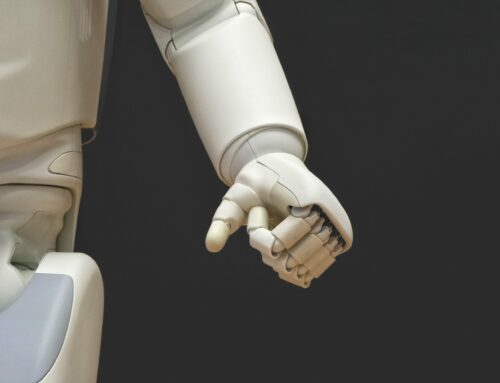ChatGPT has emerged as a remarkable advancement in AI-driven conversational systems, exceeding its predecessors in natural language understanding and generation. As the era of virtual interactions continues to thrive, it becomes imperative to examine the extent to which ChatGPT mirrors human intelligence. This article explores the key characteristics and capabilities of ChatGPT, shedding light on its strengths, limitations, and the ongoing efforts to bridge the gap between artificial and human intelligence.
Understanding ChatGPT
What is ChatGPT?
ChatGPT is a language model developed by OpenAI that is designed to generate human-like responses in conversation. It is a variant of the GPT-3 (Generative Pre-trained Transformer 3) model and is trained with a dataset comprising a wide range of internet text. ChatGPT aims to provide coherent and contextually relevant responses to user inputs, making it a powerful tool for various applications such as customer support, virtual assistants, and more.
How does ChatGPT work?
ChatGPT utilizes a deep learning approach called Transformers, which allows it to understand and generate human-like text. It uses a technique called unsupervised learning, where it learns from a vast amount of text data without explicit instructions. During the training process, ChatGPT is exposed to enormous amounts of text from the internet, learning patterns and structures of human language. As a result, when it encounters a user input, it generates a response based on the learned information and tries to provide a relevant and coherent answer.
Training process of ChatGPT
The training process of ChatGPT involves pre-training and fine-tuning. During pre-training, the model learns to predict the next word in a sentence by understanding the relationships between different words and phrases. The training data, which consists of parts of the internet, helps the model capture the nuances and complexities of human language. After pre-training, the model goes through the fine-tuning process, where it is trained on a more specific dataset and optimized for a particular task, such as generating conversational responses. The fine-tuning ensures that the model learns to generate contextually appropriate and helpful replies in real-world interactions.
Human Intelligence
Definition of human intelligence
Human intelligence refers to the cognitive abilities and mental capacity of humans to process and understand information, reason, learn, and solve problems. It encompasses various aspects of thinking, such as perception, memory, attention, language, and problem-solving. Human intelligence is a complex and multifaceted construct that enables individuals to adapt to new situations, communicate effectively, and exhibit creativity and emotional understanding.
The complexities of human intelligence
Human intelligence is a highly intricate phenomenon that cannot be easily replicated by artificial intelligence models like ChatGPT. It involves a wide range of cognitive processes, including perception, attention, memory, reasoning, and decision-making. Human intelligence allows individuals to interpret and understand the world in nuanced and sophisticated ways, making connections between disparate pieces of information and applying knowledge to new situations. It is this multidimensional nature of human intelligence that sets it apart from AI models.
Cognitive abilities in humans
Human intelligence encompasses a broad array of cognitive abilities. Perception enables humans to gather information from their environment through senses, while attention allows them to focus on specific stimuli or tasks. Memory enables the storage and retrieval of information, while reasoning involves logical thinking and problem-solving. Language is a crucial component of human intelligence, allowing individuals to communicate and understand complex ideas. Additionally, humans possess social and emotional intelligence, enabling them to empathize, connect, and interact with others.
Analyzing ChatGPT’s Capabilities
Language processing
ChatGPT demonstrates impressive language processing capabilities, enabling it to understand and generate coherent text. It can comprehend a wide range of conversational inputs, including questions, statements, and requests, and generate contextually appropriate responses. The model’s ability to process language is primarily due to the large-scale pre-training on diverse internet text, which helps it learn grammar, syntax, and semantics.
Understanding context
ChatGPT is proficient in understanding context, which allows it to generate coherent responses based on the given input. The model can consider the preceding conversation or dialogue and utilize that contextual information to provide relevant and appropriate answers. By leveraging attention mechanisms and contextual embeddings, ChatGPT can grasp the meaning behind user inputs and generate meaningful responses.
Knowledge-base
ChatGPT possesses a vast knowledge-base derived from the immense amount of text data it has been trained on. It is capable of retrieving factual information and providing relevant details on a wide range of subjects. However, it is important to note that ChatGPT’s responses are based on patterns and associations it has learned from the training data, rather than true comprehension or understanding of concepts.
Incorporating user feedback
One of the strengths of ChatGPT is its ability to incorporate user feedback to improve its responses over time. OpenAI has implemented a feedback system that allows users to rate the model-generated responses for quality. By utilizing this feedback and continuously retraining the model, OpenAI can enhance the performance and accuracy of ChatGPT, addressing its limitations and ensuring it provides more helpful and reliable responses.
Cognitive Limitations of ChatGPT
Lack of common sense
While ChatGPT has access to vast amounts of information, it lacks the common sense reasoning abilities that humans possess. Common sense reasoning refers to the everyday knowledge and understanding of the world that humans acquire through their day-to-day experiences. ChatGPT may provide responses that seem plausible based on the training data, but it may also generate answers that are factually incorrect or lack common sense reasoning.
Difficulty with nuanced context
Although ChatGPT can grasp contextual information to some extent, it may struggle with more nuanced or abstract aspects of context. It may misinterpret ambiguous queries or fail to recognize subtle implications and nuances that a human conversational partner would readily understand. This limitation can lead to inaccurate or misleading responses in certain situations.
Inability to experience emotions
Unlike humans, ChatGPT lacks the ability to experience emotions or understand the emotional nuances of human conversation. It does not possess emotional intelligence, which limits its capacity to respond appropriately to emotionally charged or sensitive topics. This lack of emotional understanding can result in responses that may appear cold, indifferent, or inappropriate in emotionally charged situations.
Limited real-world understanding
Despite its extensive training on internet text, ChatGPT’s understanding of the real-world is limited. It relies on the information it has learned from the training data and lacks genuine experiences or interactions with the physical world. This limitation manifests when responding to user queries that require real-world context or practical understanding beyond what can be learned from text alone.
Dependency on training data
Another important limitation of ChatGPT is its heavy reliance on the training data it has been exposed to. The model’s responses are primarily based on patterns and associations present in the training data, which can introduce biases or inaccuracies. Furthermore, if the training data contains misinformation or biased perspectives, ChatGPT may inadvertently reproduce those biases or provide unreliable information.
Advantages of ChatGPT Over Human Intelligence
Speed and efficiency
ChatGPT exhibits remarkable speed and efficiency in generating responses compared to human intelligence. It can process and analyze information quickly, generating coherent replies in a fraction of the time it would take a human to do the same. This swiftness can be particularly advantageous in applications that require instant responses or handling a large volume of queries.
No biases or preconceived notions
Unlike humans, ChatGPT does not possess personal biases or preconceived notions that can impact its responses. It treats all users impartially and provides responses based solely on the information it has learned from the training data. This impartiality can be valuable in scenarios where removing biases is crucial, such as providing customer support or making data-driven decisions.
Multilingual capabilities
ChatGPT demonstrates the ability to process and generate text in multiple languages, making it a versatile tool in multilingual environments. It can effortlessly switch between languages and understand inputs in various linguistic forms, facilitating effective communication with individuals who speak different languages. This multilingual capability expands its potential applications and widens its accessibility.
Consistency in responses
One advantage of ChatGPT is its ability to consistently generate responses without being influenced by external factors. Unlike humans, who may provide varying responses based on mood, fatigue, or personal biases, ChatGPT consistently generates responses based on the patterns and information it has learned. This consistency can be particularly useful in maintaining a standardized communication experience across different user interactions.
Ability to process large amounts of data
ChatGPT has the advantage of processing and analyzing vast amounts of data quickly and efficiently. It can access and retrieve information from its extensive pre-trained knowledge base, providing users with detailed and comprehensive answers. This ability to handle large volumes of data can be beneficial in tasks that involve data analysis, information retrieval, or conducting research.
Limitations of ChatGPT in Comparison to Human Intelligence
Lack of creativity and originality
While ChatGPT excels at generating coherent and contextually relevant responses, it lacks the creative and original thinking abilities of human intelligence. It relies on patterns and associations in the training data and may struggle to provide truly innovative or unique answers. This limitation restricts its capacity to generate solutions or ideas beyond what it has learned from the vast amount of existing text.
Poor understanding of humor and sarcasm
Humor and sarcasm are complex linguistic phenomena that often involve the use of irony, subtlety, and cultural context. ChatGPT may struggle to comprehend and generate humor or sarcasm accurately, leading to responses that miss the intended comedic or ironic effect. This limitation can hinder natural and enjoyable interactions, particularly in contexts that heavily rely on humor, such as comedy or informal conversations.
Lack of subjective analysis
Unlike humans, ChatGPT lacks the ability to analyze and interpret subjective aspects of language. It may have difficulty understanding nuanced opinions, preferences, or subjective experiences, as these aspects of language are often influenced by personal context and individual perspectives. Consequently, ChatGPT may provide responses that miss the subjective nuances or fail to address the subjective concerns of users.
Emotional empathy and connection
Human intelligence encompasses emotional intelligence, allowing individuals to empathize, understand, and connect with others emotionally. ChatGPT lacks this emotional understanding and connection, which can limit its capacity to provide empathetic or comforting responses in emotionally challenging situations. Its lack of emotional empathy may make it less suitable for tasks that require emotional support or understanding.
Ability to adapt and learn
Human intelligence has the remarkable ability to learn, adapt, and acquire new knowledge from experiences. ChatGPT, on the other hand, lacks the capability to learn from new experiences or adapt its responses based on user feedback alone. Although OpenAI has implemented a user feedback system to improve the model, ChatGPT’s learning is still limited and relies on updates by its developers. This contrast highlights the inflexibility of ChatGPT compared to the adaptive nature of human intelligence.
Concerns and Ethical Considerations
Responsible use of AI in decision-making
One of the key concerns with AI, including ChatGPT, is the responsible use of AI in decision-making processes. While AI systems can provide valuable insights and support decision-making tasks, it is essential to consider the limitations and potential biases of AI. Decision-makers should exercise caution and ensure that human oversight and accountability are in place when relying on AI-generated outputs to minimize the risk of errors or biases.
Potential biases in AI-generated responses
AI models like ChatGPT are trained on large datasets that may inherently contain biases present in the training data. These biases can be unintentionally reproduced in AI-generated responses, perpetuating discriminatory or unfair perspectives. It is crucial to continuously monitor and mitigate biases in AI models to ensure fairness, equity, and inclusivity.
Danger of misinformation and manipulation
Given ChatGPT’s ability to generate human-like text, there is a risk of malicious use leading to the spread of misinformation or manipulation. ChatGPT might generate plausible but inaccurate information, making it challenging for users to distinguish between fact and fiction. Careful monitoring, fact-checking, and responsible deployment of ChatGPT are necessary to minimize the potential risks associated with misinformation and manipulation.
Legal and accountability challenges
The use of AI models like ChatGPT can present legal and accountability challenges. Determining liability and responsibility for AI-generated outputs can be complex, as decisions or actions taken based on the model’s responses may have legal implications. Preemptive measures, such as clear user disclosures and appropriate disclaimers, are necessary to establish accountability and mitigate potential legal issues.
Future Possibilities and Research Directions
Improvements in natural language understanding
Continued research and development in natural language understanding and processing can enhance ChatGPT’s ability to understand and generate more contextually accurate and nuanced responses. Advancements in areas such as semantic understanding, entity recognition, and coreference resolution can contribute to the refinement of ChatGPT’s language comprehension capabilities.
Integration with domain-specific knowledge
Integrating ChatGPT with domain-specific knowledge can enhance its usefulness and accuracy. By incorporating specialized knowledge from various fields, such as medicine, law, or finance, ChatGPT can provide more reliable and domain-specific responses. This integration would require careful curation and validation of the knowledge base to ensure the accuracy and relevance of the generated information.
Enhancing ethical and unbiased AI
Research efforts should focus on developing techniques to ensure ethical and unbiased AI models. This includes methods to detect and mitigate biases in training data, as well as designing AI systems that consider ethical considerations, fairness, and inclusivity. Robust and transparent guidelines should be established to govern the training and deployment of AI models to promote responsible and unbiased practices.
Collaboration between AI and human intelligence
Rather than viewing AI as a replacement for human intelligence, exploring the potential for collaboration between AI models like ChatGPT and human intelligence can lead to novel possibilities. Combining the strengths of AI, such as fast information retrieval and processing, with human intelligence’s emotional understanding and creative problem-solving abilities can result in more effective and balanced outcomes.
Conclusion
ChatGPT represents a significant milestone in the development of AI language models, demonstrating impressive language understanding and generation capabilities. While it possesses advantages such as speed, efficiency, and multilingual capabilities, it is important to recognize its limitations, such as lacking common sense reasoning and emotional understanding. Responsible use, addressing biases, and ensuring human oversight are crucial factors for the ethical deployment of ChatGPT and future AI systems. Continued research and advancements in natural language understanding, domain-specific knowledge integration, and ethical AI development can unlock further potential and foster collaboration between AI and human intelligence in the pursuit of creating more beneficial and responsible AI systems.








Leave A Comment